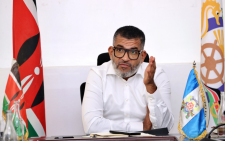Delicate balance in Nairobi ties with Washington

President William Ruto’s visit to the United States marked a significant moment in Kenya’s international relations, but it also highlights the delicate balance Kenya must strike between attracting Western investment and managing existing commitments, especially with China.
Granted, this visit saw the signing of several deals, which signifies the strategic importance of Kenya to the US, but also the growing geopolitical complexities Kenya must soon navigate due to its changing stance and allegiances.
Ruto was the first African leader to make a state visit to the US in over 15 years, placing him in a unique historical context and following in the footsteps of former Kenyan presidents Moi and Kibaki, both of whom had made similar visits.
The good news is that during this trip, extensive agreements were forged, worth an estimated Sh52 billion, impacting sectors including trade, education, health and security, and reflecting a comprehensive engagement in addressing Kenya’s needs. Among the notable deals is a substantial Sh900 billion agreement aimed at combating HIV/AIDS, emphasising Kenya’s health priorities.
Additionally, educational agreements promise significant benefits, with the US committing Sh435 million for Kenyan students to study STEM subjects in the US and another Sh66 million for Partnership 2024 to enhance the development of Kenyan students, scientists, researchers, and engineers.
The collaboration on global health security, particularly a Sh528 million deal with the US CDC, demonstrates a commitment to strengthening Kenya’s health infrastructure.
The bad news is that on the security front, Kenya’s decision to send police officers to Haiti under a UN-sanctioned mission will continue, regardless of contrary opinion from most Kenyans and the clergy.
For the government, this move will enhance Kenya’s standing on the global stage by positioning it for favourable UN-backed funding, in what is a strategic use of Kenyan forces abroad. Moreover, discussions on regional mediation efforts, including the South Sudan peace deal and potential involvement in the Rwanda-DRC tensions, underscore Kenya’s growing reputation as a key player in regional stability.
However, the backdrop of intensifying US-China rivalry in Africa adds a layer of complexity to Ruto’s economic and diplomatic endeavours. Kenya’s substantial debt to China, accrued through loans for infrastructure projects under previous administrations, poses a significant challenge in this shift.
The US, seeking to counter China and Russia’s influence in Africa, sees Kenya as a strategic ally. Yet, with this geopolitical tug-of-war, Ruto must balance the benefits of new US investments with the reality of existing Chinese economic ties.
China’s vigilance over Kenya’s engagement with the US is understandable given the billions in loans it has provided.
This development creates a scenario where Ruto must now leverage US interests to secure new investments while maintaining a strong cooperative relationship with the likes of China.
It will be interesting to see how Kenya will position itself as a crucial partner to both powers, thereby deriving the maximum benefit for its economic and developmental needs.
The challenge will be in ensuring that while Kenya reaps the benefits of these new engagements, it does not jeopardise its longstanding relationships with other global powers. This careful balancing act is crucial for Kenya’s economic stability and geopolitical relevance in the rapidly evolving global order.
While at it, the president must remember that there is no free lunch. Much as Kenya looks set for favours from the West, there is a need to learn from history, whereby close ties with the US mean Kenya must work closely with the World Bank and the IMF.
Given our high levels of debt, the country will be tempted to borrow more. With taxes also hitting their limits, the potential impact on the economy may be significant.
— The writer is Business Daily’s Business Editor












